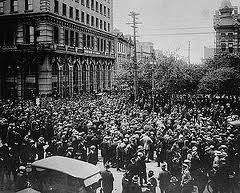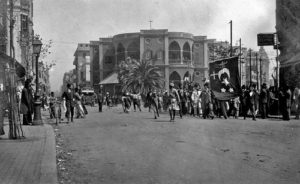 After the Great War soldiers returned home to find very high prices for foods, and a small slump in the economy that removed a few jobs. There was no room in the work force for many of the thousands of soldiers returning home, not even with their wives leaving the work force.
After the Great War soldiers returned home to find very high prices for foods, and a small slump in the economy that removed a few jobs. There was no room in the work force for many of the thousands of soldiers returning home, not even with their wives leaving the work force.
The people that did have jobs were unhappy with their working conditions and life. They had been promised that after the war life would be better than it had ever been. They wanted more.
Associations of workers that were advocating rights, wages, standard hours, medical benefits and equality were brutally repressed in many nations. Their most notable form was the Union.
In Western Canada the idea of the Union became very strongly represented in labour and political movements.
In 1919 many of the workers unions came together in Calgary to form One Big Union or the OBU. They had complex demands across many different industries and threatened to hold massive city wide strikes if their demands were not met.
Many Canadian politicians saw the labour movement as the beginnings of Communism. Others were just worried about what they would have to give up as businessmen to appease the Union’s demands.
Above all very few people with power or money wanted Canada to degrade into a Revolution like Russia.
In May of 1919 an association of building unions got together in Winnipeg and staged a city wide strike. They were looking for higher wages and a reduction in the number of  hours of the work week. They also wanted the unions to be recognized as the workers representative to barging with employers and the city. Many other unions joined them and the city was effectively shut down.
hours of the work week. They also wanted the unions to be recognized as the workers representative to barging with employers and the city. Many other unions joined them and the city was effectively shut down.
These men were primarily soldiers from WWI. After a few days of unrest and small amounts of violence the government called the RCMP in to remove the strikers. 2 people died in the fighting and the strike was eventually called off.
The fear of revolution was too high for government officials to ignore an action like a city wide strike, even though there was no proof that the workers intended to stage a revolution.
This action brought the idea of labour movements, unions and the needs of the worker to the front of people’s thoughts. It inspired many social movements to protect workers in the future but did nothing in 1919.
